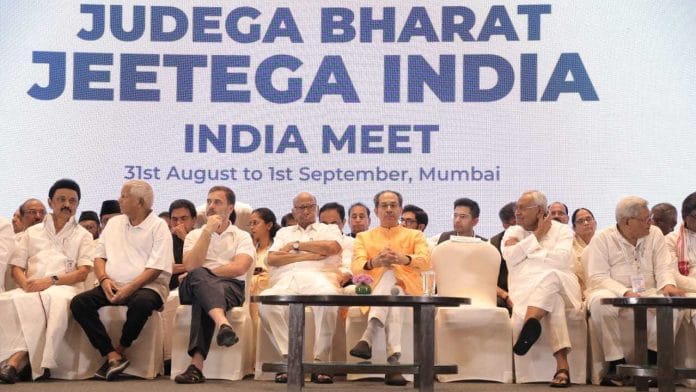Thank you dear subscribers, we are overwhelmed with your response.
Your Turn is a unique section from ThePrint featuring points of view from its subscribers. If you are a subscriber, have a point of view, please send it to us. If not, do subscribe here: https://theprint.in/subscribe/
As the child of parents who indirectly contributed to saving India during one of its most challenging periods, I grew up with a deep understanding of the complexities of governance, geopolitics, and social justice. My parents were among those who had the ear of Dr. John Kenneth Galbraith, the eminent economist who played a pivotal role in India’s survival during the 1962 Sino-Indian War. Galbraith, a frequent guest speaker during his time as a visiting professor at UC Berkeley, shared not just his intellectual brilliance but also his strategic foresight over tea and samosas during India Student Nights. His insights, along with his close relationship with President John F. Kennedy, were instrumental in saving India when China attacked, and his influence was felt again during his later contributions to India’s agricultural policies.
John Kenneth Galbraith’s contributions to India went beyond military aid; he played a pivotal role in shaping the country’s agricultural policies, particularly the Minimum Support Price (MSP) system. Galbraith’s involvement in the MSP’s development was deeply influenced by the devastating Bengal Famine of the 1940s, a tragedy exacerbated by policies influenced by John Maynard Keynes and Winston Churchill. Determined to prevent such a catastrophe from recurring, Galbraith advocated for a system to stabilize agricultural prices and protect farmers from market fluctuations. While he later critiqued the MSP as inflationary and sub-optimal, his foundational work has been crucial in preventing severe agricultural distress in India.
Growing up in a liberal household, where my parents were connected to influential figures like Galbraith, from their graduate school days at UC Berkeley, I was instilled with strong values of social justice, equality, and inclusivity. Our home was a melting pot of cultures and religions, with friends from Muslim, Sikh, Jewish, Buddhist, and Christian backgrounds. This diversity profoundly shaped my worldview. So, when Narendra Modi was first elected as Prime Minister of India, my friends, family and I were concerned. Modi’s reputation as a hardline nationalist and the lingering shadows of the 2002 Gujarat riots made us wary of his impact on India’s pluralistic society.
However, as Modi’s tenure progressed, my parents, initially skeptical, grew increasingly impressed by his governance. I too researched and published on the biases in the so-called Gujarat Files and found it to be of no evidentiary value as the courts declared. Modi’s focus on economic development, infrastructure improvement, and national security resonated with their belief in a strong, self-reliant India. Over time, they became admirers of Modi, recognizing that his leadership, though imperfect, was steering India in a direction aligned with their vision for the country’s future. This evolution in their views made me question whether the broader liberal media in India, often critical of Modi, were providing a fair and balanced assessment of his policies.
A glaring example of this disconnect is the I.N.D.I. alliance, a coalition of opposition parties that positions itself as a defender of secularism, social justice, and democracy. However, this alliance includes parties and leaders who have been complicit in or have directly supported practices and policies that contradict these very principles. Take, for instance, the alliance’s support for the continuation of Triple Talaq, and the Sharia Law, a practice that discriminates against Muslim women and undermines their rights. Despite the Supreme Court’s ruling against Triple Talaq, the I.N.D.I. alliance has used this issue to pander to conservative Muslim male votes, rather than standing up for gender equality and the rights of Muslim women.
The same can be said of the alliance’s tolerance of corruption, criminality, and goonda raj (rule by thugs) within its ranks. While these issues are frequently highlighted when it comes to Modi and his party, there is a conspicuous silence when similar or worse transgressions occur within the I.N.D.I. alliance. This double standard raises the question: Have India’s liberals and the left-of-center media been misled by the I.N.D.I. alliance’s rhetoric? Have they allowed their opposition to Modi to cloud their judgment, leading them to ignore or downplay the regressive and anti-democratic elements within this coalition?
As someone who has witnessed the importance of balanced and informed decision-making, I believe it is crucial for India’s media and intellectuals to reassess their approach. It is not enough to simply oppose Modi; it is essential to critically evaluate the alternatives and ensure that the values of social justice, equality, and democracy are genuinely upheld.
Akshay Sharma is a media/tech consultant, ex-CTO, advisor at Lionfish Tech, and published author. He helped ban Huawei in the West and serves on the board of Somy Ali’s NGO, No More Tears, combating domestic violence and human trafficking.
These pieces are being published as they have been received – they have not been edited/fact-checked by ThePrint


